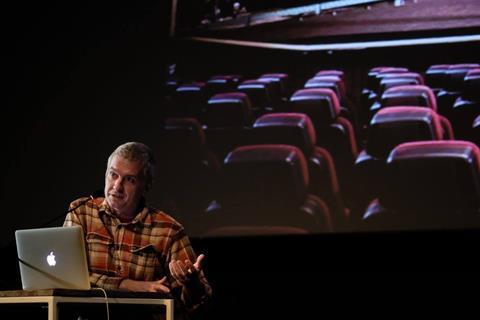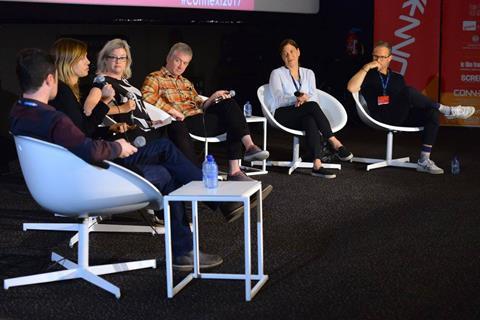
At Connext in Ghent, Alamo Drafthouse and Neon’s Tim League talks about improving the consumer experience in cinemas; expert panel explores curation vs algorithms.
In his keynote address at Connext in Ghent, Tim League of US distributor Neon and exhibitor Alamo Drafthouse, talked about the challenge of opportunities of the theatrical experience in the rapidly changing digital age. “Netflix does pose a really interesting challenge, in that cinemas must maintain their relevance with consumers,” League said. “When you walk into a cinema and pay 10 or 20 dollars for a movie, it should be worth that.”
He continued, “The experience you get in a cinema needs to be incredible. If not, we risk movies as we know them possibly going away in future generations. I don’t want to dismiss the threat of Netflix.”
Alamo Drafthouse has become one of the most lauded exhibitors in the US concentrating on the consumer experience: programming great films, hiring having managers with local expertise, bringing in chefs to improve the cinema culinary experience, and also ensuring its cinemas have the best tech specs– he noted, for example, that Alamo Drafthouse staff checks audio quality in its screens five times per day.
The chain of cinemas, which Tim and Karrie League founded in Austin, Texas in 1997, and now includes 29 sites from New York to Colorado, has a common mission statement across its venues: “ensure every guest has an awesome experience and is excited to come back.”
He reiterated that Netflix was a very different animal to Alamo Drafthouse. “I feel like they are in a completely different business it’s a commodity business and about maximising a global subscriber base. We’re in a mostly different business: a storytelling business and an experience business. “
Algorithms vs Curation
After League’s keynote talk, he joined a panel of other industry experts to discuss algorithms vs curation in the film world.

The panellists agreed that data can help in connecting films to audiences, even if the word ‘algorithm’ sounds a bit ominous.
Bobby Allen of MUBI said, “We do use data but more to understand what people watch in different territories. We don’t use it to programme the films, that’s done by programmers more like a film festival, they choose the films they like and it’s a human experience behind that.”
League added, “I love data and I like to use data a lot to inform our decisions,” and for instance Alamo Drafthouse hired its first “growth hacker” earlier this year to look at data to influence some customers to come to the cinema more often.
“Is an algorithm bad, is an algorithm good?,” League asked. “With great power comes great responsibility, it’s about how you use it. Data can be powerful in the pursuit of getting people to become cinephiles.”
Famously, Netflix used customer data as the starting point to create original shows like House Of Cards and Stranger Things. Allen said, “The writers who sat in the room that created Stranger Things were not algorithms. They had to come up to creative answers to the problems posed by the algorithims.”
He continued, “We have a saying that no algorithm ever cried in a film or put a film poster up on their wall or fell in love in the cinema. This human element of what makes us so passionate about film is missing. But on the very fine point, but if algorithms can help us define a better customer experience, then long live the algorithm. “
Fandor’s Gail Gendler agreed “algorithms can have different uses in terms of building engagement and retention.” At Fandor they use human curation and editorial voices but combine that with data and technology to introduce the right films to the right audiences.
League agreed that data can be very powerful in marketing plans, for instance for Neon’s forthcoming release of I, Tonya, “We are developing a pretty intricate marketing platform because we think this is a universal story. The message we present to arthouse audiences is different than, say, the message to Trump voters…We’ll have 20 iterations of a Facebook campaign and we’ll monitor that.”
Marike Muselaers of Benelux producer/distributor Lumiere said that smart businesses could evolve to serve audiences better. “In Benelux, people are searching for an hour per day for content. We need guidance, we need curation, we need marketing. I think there is room for both human curation and algorithms, the art of recommendation and the science of recommendation can come together.”
She added, “People nowadays want to watch things straight away, they want to have access to it, they don’t want to search for an hour. We as an industry need to find a way to provide that.”
Kolmar said, “There is still a lot of value in the idea of a person or a group of people curating content. What people really want is an organising principle to find out what’s available and how they can easily access it. Festivals do that of course, but all these platforms do it as well. We need to make it easy for people to get to the content they want.”
Gendler of Fandor also added that film festivals were still a vital element of curation across the globe. “The film festival programmer is vital as a non-algorithmic point of entry for people who love movies. To me that’s an amazing asset that we have.. It starts with a human touch and dialogue and people being open to risk taking.”
Unsurprisingly, SXSW’s Kolmar agreed that human curation was here to stay. “We showed a film this year that everybody was surprised we showed. Even the sales agent said, ‘Why do you want to show this film? It’s not the kind of film you show!’ That’s exactly why we took that film – we loved it, it was unexpected and people responded to it. An algorithm would have filtered that out.” In future, he wondered, “How do you build that element of surprise into the algorithm process?”
Connext growth
Other sessions at Connext’s Camp day (aimed at local filmmakers) included a talk about film festivals, AMPAS’s Meredith Shea explaining Oscar qualifying rules, and marketing and distribution expert Deborah Rowland of the UK’s We Are The Tonic and NFTS, who offered practical advice like identifying a specific audience and getting them engaged as early as possible, planning assets (particularly stills) from pre-production, and having a film title that’s easy to pronounce.
Connext had 25% more foreign guests in its second year, with total accreditations of 250 up from 160 at 2016’s inaugural edition. One reason for the increase was including TV in addition to film. TV projects presented included psychological thriller Tabula Rasa starring The Broken Circle Breakdown’s Veerle Baetens (produced by Caviar and sold by ZDF) and crime drama/thriller The Day, about a hostage crisis in a bank (produced by FBO and sold by Dynamic Television).
In addition to screening finished films like Michael Roskam’s Racer And The Jailbird and Gilles Coulier’s Cargo, Connext also hosted pitches for projects in development and works-in-progress presentations.
Connext is organized by Flanders Image (part of the Flemish Audiovisual Fund (VAF) with the support of Grid VFX, Lites, Lux, Creative Europe Media Desk Flanders, Film Fest Ghent and Screen Flanders.
Screen International is a media partner of Connext.















![[L-R]: Amanda Villavieja, Laia Casanovas, Yasmina Praderas](https://d1nslcd7m2225b.cloudfront.net/Pictures/274x183/6/4/1/1471641_pxl_20251224_103354743_618426_crop.jpg)









No comments yet